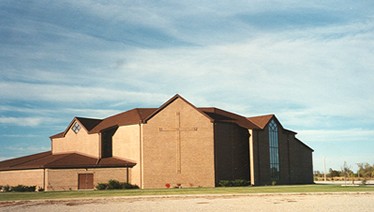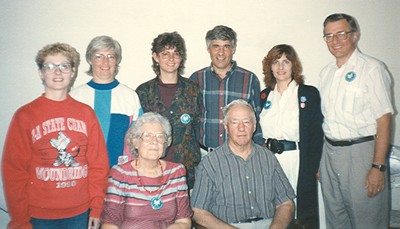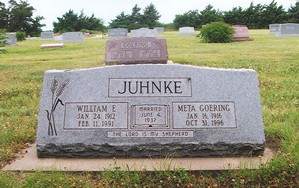|
Bill and Meta had contributed generously to the founding and development
of the Memorial Home just south of Moundridge, which had served as
a retirement home beginning in 1958. By the 1980s, the complex had
expanded to include facilities for independent living, dependent living,
and nursing care. Bill remembered the difficult final years and months
of his grandfather Carl Juhnke's life, noting that the family could
have used such a facility then. But Bill believed that people who
were still able to take care of themselves should not move to a retirement
center. He adamantly refused suggestions that it would be best for
him and Meta to make the move while they were in reasonably good health.
Then on January 9, 1990, still at the house by Elyria, Bill's declining
health collapsed definitively. He became "delirious" and that morning
fell into the bathtub when Meta was trying to help him get dressed
for the day. Meta called neighbors to get him out of the tub and transport
him to the Bethel Deaconess Hospital in Newton. It soon became clear
that the time to move to Moundridge had come, and that Meta and Jim
should get legal authority to do so. With her family's help, Meta
on January 22 made a down payment on an apartment at Pine Village,
adjacent to the Moundridge Memorial Home. The next day they moved
furniture, kitchen items, and other things from the Elyria house to
the Pine Village apartment. On January 23, Bill was moved from Bethel
Deaconess Hospital in Newton to a "respite care" room at Mercy Hospital
in Moundridge. A therapist who came to his room asked some questions.
"How many fingers am I holding up? (6)" "Four," replied Bill. "What
are your goals in life?" Said Bill, revealing primal priorities, "I
want to drive my car again. And I want to attend the dedication of
the new Eden Church."

New Eden Mennonite Church, built 1989-90.
After a month, he had recovered sufficiently in mind and body to
accept a move to the Pine Village apartment. Meta wrote in her diary
that night, "Candy, Tara and I got Bill home from Mercy Hospital at
1 p.m. So far, so good." "Home" was now at Pine Village.
The apartment for independent living that Meta so quickly learned
to call "home" was where they lived together until Bill died just
over a year later (February 14, 1991). Then Meta lived there alone
until she fell and broke her hip not quite five years later (October
2, 1994). Meta's role in her final year with Bill was akin to that
of a full-time caregiver, especially in the later months. He always
yearned to return to the farm where he could check out the farmstead
or chop weeds and trim trees in the pasture. On March 16, 1990, Meta
recorded in her diary that Bill had "walked to the Home and asked
if he could put up a request for a ride to Elyria. Lois (Memorial
Home administrator) asked him if his wife knew he was there. He said
yes he told her." Lois called Meta to learn the truth.
With the passing of time Bill recovered enough to be able to drive
the car and get himself to the farm by himself, but Meta always wondered
if he would find his way back. On one occasion he filled the car with
gas at a self-help pump at the Moundridge Co-op station and forgot
to go in and pay for the gas. Someone at the Co-op fortunately saw
him drive off and telephoned the Juhnke apartment. Bill immediately
returned to pay the bill. Fortunately they lived in a small town community
where everyone knew everyone and realized what was going on.

The last photo taken of Bill and Meta and their children,
Candace, Janet, Sharon, Bill Jr., Ruth, and Jim. September 1990.
On Christmas Day 1990, Meta wrote "Bill hasn't improved. He still
seems to be in the denial stage." Meta could not share the most private
details in her letter, but one reality Bill had trouble accepting
was that sexual relations were no longer possible for him. Dr. Kaufman
had been quite forthright on the point. Bill's condition and the medications
he was taking ruled out sex. Nevertheless, Bill would blame Meta when
he couldn't perform. Meta wrote, "I'm trying but find myself getting
impatient too often. It would be worse if he had to take care of me."
Meta's caring for Bill was complicated by her own physical infirmities.
For years she had to deal with pains in her feet that the doctors
identified vaguely as "peripheral neuritis" and for which the prescribed
circulation medicine did not work. She had no more luck with acupuncture
or reflexology. In addition she was afflicted by macular degeneration,
an eye disease that prevented her, after about 1988, from continuing
her beloved work of quilting. She continued reading with magnifying
glasses as long as she could.
Bill's final decline moved quite rapidly. On January 26, 1991, he
was admitted to Mercy Hospital in Moundridge. On February 6 he was
removed to nursing care at the Memorial Home where he soon lost his
ability to take adequate nourishment to stay alive. Meta, with the
support of her children, made the difficult decision not to arrange
for intravenous feeding. He died on February 11. The community network
of support swung into action with donated food, gifts of flowers and
expressions of condolence. The funeral at the Eden Church was well
attended and included the customary elements: burial service in the
cemetery just west of the church; separate family sharing prior to
the main service; singing by the Eden men's chorus (twenty-three voices
singing "In the Rifted Rock I'm Resting" and "O Mein Jesu Du Bist
Wert); tribute by the oldest child; sermon by Ed Stucky, Bill's former
high school student; meal of sandwiches, chips and pie; and a time
for wider sharing of memories with Bill Jr. presiding at the microphone.
Though her grief was profound, Meta soon learned to take advantage
of her freedom from full-time care giving. One major task was preparation
for the sale on June 1, 1991, of the farm homestead, the farm tools
and machinery, and accumulated goods of a lifetime. It was an occasion
for more family sharing and bonding as they made decisions about what
items to distribute to the children and what to let go. Two nights
before the sale, a windstorm blew down the large old mulberry tree
west of the house that had grown up with Bill in his early years and
for decades had provided large sweet mulberries for the Juhnke family.
The family speculated that the tree had decided it didn't care to
continue living if Bill Juhnke was not going to be there. The sale
was well attended and the bidding for major items was brisk. The family
was pleased with the financial results.
In Bill's absence Meta was able to take advantage of social, cultural
and educational events at Pine Village, the Eden Church, and Bethel
College. She had become comfortable living her retirement community
where she knew so many people who had been part of her church. Her
sister Marjorie, and brother in law Marvin Stucky, lived at Pine Village.
Meta loved to reminisce about her early years, as well as to keep
in touch with the progress of her grandchildren. A year after losing
Bill, Meta dictated (and Candy wrote, as writing had become difficult
for Meta) a contribution to the Goering round robin letter that indicated
the texture of her life at that point:
"I continue to take part in the activities available to me here
at Pine Village. Last night, we had a pot-luck dinner. Today, I
was invited out to lunch at Pizza Hut with two neighbors. Tomorrow
I will go to Bible Study and then to Life Enrichment at Bethel College.
Friday I will eat lunch at the Senior Center.
"As I look forward to spring, I think of planting garden, of Easter
celebrations (including the Messiah with Clyde, Marjorie, Jessica
& Candy singing), and graduations (of grandchildren)--Eric from
Graceland College, Karl from Reed College, Celeste from El Camino
High School, and Carrie from 8th grade."
One measure of Meta's new independence was in the realm of personal
finance. In April 1991, less than three months after Bill died, she
decided to purchase long term care insurance. Her son, Jim, impressed
with the high annual premium of $900 per year, advised against buying
the insurance. As it turned out, Meta paid the premiums for just under
four years, and then, after surgery and a stroke, lived in the nursing
section of Memorial Home for two years. The insurance payments of
forty dollars a day for Meta's nursing care saved the family more
than $25,000.
On May 1, 1993, Ruth Juhnke married Chester White in a ceremony at
the Eden Mennonite Church. Chester was employed as a set designer
and builder for the Repertory Theater at the University of Missouri
in Kansas City. Meta, with her traditional views of gender roles,
took great satisfaction in knowing that Ruth now had someone "to take
care of her." Meta was also delighted with the birth of Ruth and Chester's
daughter, Angelica Shanti White, on May 5, 1994. Angelica was Meta
and Bill's thirteenth grandchild.
Meta died at age 80 on October 31, 1996, five days after a severe
stroke. She was the oldest of twelve Goering siblings, and the first
of her family to die. Her name was already beside that of her husband,
Bill, on a memorial stone just west of the Eden Church. The memorial
service was a great extended family, church and community event. The
gatherings included a Friday evening reception at the funeral home
in Moundridge , the Saturday funeral at the Eden Church (burial ceremony,
pre-funeral meeting of family members for instructions and for memory
sharing, the funeral ceremony itself including sermon and special
music, the post-ceremony meal and open-mike sharing of memories of
Meta), and a Sunday afternoon meeting of Meta's siblings and their
families at the Moundridge Memorial Home. Candy, Meta's youngest daughter,
functioned as head of the family in making local arrangements and
hosting the family gatherings. She and Vance served twenty-seven people
at the meal before the funeral on Saturday.
Janet, the oldest daughter, presented the tribute to Meta at the
funeral service. How can we, she asked, "summarize briefly a life
of eighty full and busy years. Do we say daughter, sister, wife, mother?
Do we say scholar, teacher, homemaker, farmer? Or how about cook,
seamstress, gardener, launderer, manager of accounts, nurse, arranger
of schedules, chauffeur, wiper of runny noses, comforter of hurts,
hearty laugher at jokes, taskmaster and disciplinarian, applauder
of performances, encourager of best efforts, counselor to broken hearts,
believer in potentials? We must say committed Christian, church volunteer,
pray-er, giver, carer, potluck contributor, baker of pies for funerals,
Bible-reader, hymn-lover. . . ."

William and Meta Juhnke gravestone in Eden Mennonite Church cemetery.
For the grieving children and grandchildren of Bill and Meta Goering
Juhnke, Meta's death in 1996 marked a passage of generations, freighted
with meaning. One way to deal with that passage was found in one of
Bill's letters, written nearly two decades earlier to a friend who
was grieving the death of her own father. Bill had recently attended
the funeral of Linda Kaufman (Mrs. Paul D. Kaufman) where Linda's
nephew, Dr. Gordon Kaufman, Professor of Theology at Harvard University
and the son of Bill's mentor, Edmund G. Kaufman, had given the meditation.
On May 25, 1967, Bill wrote to his friend two paragraphs that he called
a "paraphrase" of Gordon Kaufman's message:
"In the event of death we are brought to the deepest mystery--especially
when the life has been useful. Sometimes we wonder if Life is not
a cruel mockery when in death all is gone. It is when death strikes
that we wonder what has true meaning. There is so much to be thankful
for: a life companion; children who have come to bless the home
and whose nurture has been shared in; a vocational service has been
shared in the community; a faithfulness to Christ has been promoted;
support of the Church and its mission have been championed. This
memorial remains even as a reminder of what has been lost.
"Our final destiny is hidden from our lives. It is not really
in our hands. As we face death we face the ultimate powerlessness.
Then we can see what Faith in God really is. Then it is that we
can put our trust in the hands of a loving God without reservation.
Perhaps it is painful but it can lead us into an understanding of
the real meaning of Life. It enables us to turn in faith and trust
and love to the God of our Creation."
|